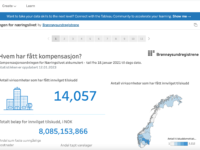To tackle air pollution and climate-related challenges, Milan has devised and executed a groundbreaking initiative to engage citizens in sustainability planning – the Permanent Citizens' Assembly on Climate. By fostering inclusive deliberations, the Assembly puts forth tangible recommendations for the city's long term sustainable development agenda. Its innovative model guides an equitable transition that positively impacts all residents ensuring durable civic participation in policymaking.
Innovation Tag: Open Government
The project considered the main needs that the Senate is facing:
-The need to facilitate citizens' access to public information, large number of requests, long time for responses
-Time consuming processes, the need to streamline internal processes
-The need to improve transparency of national decision-making process
-Low digital skills of employees
The project is innovative by digitizing internal workflows (mostly used only paper format), employee training and external processes for citizens
Cyd (pronounced “Keyed”) is the community-led platform for procurement and commercial practitioners across the public sector in Wales.
It’s helping the Welsh public sector to learn from and support each other to implement policy through their day-to-day activities, in line with the Well-being of Future Generations (Wales) Act 2015.
The characteristics of Cyd are: user-centred, design-led, iterative and incremental, collaborative, multidisciplinary, and working in the open - inherently…
The City of Vienna offers a wide range of online services for the convenience of its citizens. The "Mein Wien" platform provides a personalized, one-stop solution for accessing city-related information, simplifying tasks such as registering a residence or paying dog license fees. It goes beyond traditional methods and ensures that citizens experience greater convenience and efficiency in their interactions with the government. With real-time updates on public transportation, weather, air…
The single digital platform of the Peruvian State offers guidance information for citizens about procedures and services. It centralizes the institutional pages of all entities, as well as all their regulatory information, publications, news and campaigns. It is focused on being an accessible platform that can be used by all people on all devices, considering principles of accessibility and inclusion.
The digital compensation scheme was created to support Norwegian businesses to endure the financial consequences of the Covid-19 pandemic. The scheme designed was quick, efficient, and can be relaunched when needed. Checks are done before the disbursement, which minimizes the need for verification afterwards and also prevents misconduct. Applications are approved by an auditor, and then automatically processed and checked against information from a variety of sources and registers. Information…
Citizens and businesses often face complex, expensive and non-transparent procedures in order to acquire licenses, permits or certificates, or to fulfill their obligation(s). To solve this issue, the Register of Administrative Procedures (RAP) and its public portal provide information about more than 2300 procedures for citizens and businesses within competences of more than 90 authorities in Serbia – all in one place. It makes public services easy, transparent, predictable and accessible…
ANII, in collaboration with the private sector and the support of Uruguay's Ministry of Health, is piloting a novel Open Innovation Initiative (MH2030). Ageing populations and rising numbers of people with multiple chronic diseases are placing an increasing burden on health systems. There is a need for improving healthcare by fostering an innovative environment. Through this new co-creative approach, local entrepreneurs work collaboratively with partnering healthcare institutions to tailor and…
The Knowledge Platform with the working title of 'ERA-volution' is a community space for dialogue on current EU initiatives between policy makers and stakeholders in Slovenia in the fields of Higher Education, Research and Innovation. In this way, we aim to strengthen the co-design and joint implementation of policies in these areas, to support cooperation of Slovenian stakeholders in EU initiatives, and effectively promote synergies between the fields.
DYPA, the Hellenic Public Employment Service (former OAED) has developed myDYPAapp, a mobile application that provides citizens with access to DYPA’s online services from their mobile phones. It was launched in February 2021, as an adaptation of DYPA’s services to new needs and modern technology that require the digitization of services, interaction and immediacy in serving citizens’ needs. myDYPAapp is innovative as it includes a wide range of user interaction possibilities with DYPA.





